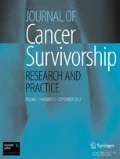Abstract
Introduction
Despite the value of genetic counseling (GC) and genetic testing (GT) for high-risk breast cancer survivors, little is known about their uptake and validity of self-report data. This study evaluated the accuracy of self-reported genetic counseling and testing rates among breast cancer survivors.
Methods
The current analysis focused on Stage 0-III female breast cancer survivors who were identified from an academic medical center’s cancer registry and responded to a mailed survey (N = 452). Self-reported rates of GC and GT were validated using information from the electronic medical record.
Results
Overall, 30.8 % of survivors reported having seen a genetic counselor in the time period after their breast cancer diagnosis and 33.6 % noted having a genetic test. Concordance and specificity were good for both genetic questions; concordance agreements ranged from 86–88 %, while specificity was 83–86 %. Sensitivity (97–98 %) and negative predictive values (99 %) were excellent, while the positive predictive values for both GC and GT were poor (59–63 %).
Conclusions
Among breast cancer survivors, self-reports of GC and GT were generally accurate, although a subset of respondents overestimated genetic service utilization. Future work should focus on validating GC and GT self-reports in medically underserved populations.
Implications for Cancer Survivors
Genetic counseling and testing are valuable aspects of survivorship care for high-risk breast cancer survivors; accurate understanding of their use is important for survivors, clinicians, and researchers.
Similar content being viewed by others
References
American Cancer Society, “Breast Cancer: Detailed Guide,” 2012. [Online]. Available: http://www.cancer.org/cancer/breastcancer/detailedguide/breast-cancer-key-statistics. [Accessed 22 February 2013].
Griffith GL, Edwards RT, Gray J. Cancer genetics services: a systematic review of the economic evidence and issues. Br J Cancer. 2004;90(9):1697–703.
NCCN, Inc., NCCN clinical practice guidelines in oncology: genetic/familial high-risk assessment: breast and ovarian. Inc, Fort Washington: National Comprehensive Cancer Network; 2012.
Trepanier A, Ahrens M, McKinnon W, Peters J, Stopfer J, Campbell Grumet S, et al. Genetic cancer risk assessment and counseling: recommendations of the National society of Genetic Counselors. J Genet Couns. 2004;13(2):83–114.
National Cancer Institute, “Genetics of Breast and Ovarian Cancer (PDQ®),” 21 December 2012. [Online]. http://www.cancer.gov/cancertopics/pdq/genetics/breast-and-ovarian/HealthProfessional/page2/AllPages. [Accessed 22 February 2013].
National Cancer Institute, “BRCA1 and BRCA2: Cancer Risk and Genetic Testing,” 29 May 2009. [Online].http://www.cancer.gov/cancertopics/factsheet/Risk/BRCA#r6. [Accessed 22 February 2013].
Campeau PM, Foulkes WD, Tischkowitz MD. New genetic developments, new therapeutic avenues. Hum Genet. 2008;124(1):31–42.
Liu Y, Diamant AL, Thind A, Maly RC. Validity of self-reports of breast cancer treatment in low-income, medically underserved women with breast cancer. Breast Cancer Res Treat. 2010;119(3):745–51.
Barisic A, Gelndon G, Weerasooriva N, Andrulis IL, Knight JA. Accuracy of self-reported breast cancer information among women from the Ontario site of the Breast Cancer Family Registry. J Cancer Epidemiol. 2012;2012:1–11.
Larouche G, Bouchard K, Chiquette J, Desbiens C, Simard J, Dorval M. Self-reported mammography use following BRCA1/2 genetic testing may be overestimated. Fam Cancer. 2011;11(1):27–32.
Phillips K, Milne RL, Buys S, Friedlander ML, Ward JH, McCredie MR, et al. Agreement between self-reported breast cancer treatment and medical records in a population-based breast cancer family registry. J Clin Oncol. 2005;23(21):4679–86.
Carpentier MY, Tiro JA, Savas SL, Bartholomew LK, Melhado TV, Coan SP, Argenbright KE, Vernon SW. Are cancer registries a viable tool for cancer survivor outreach? A feasibility study. J Cancer Surviv. 2013;7(1):155–63.
Tisnado DM, Adams JL, Liu H, Damber CL, Chen WP, Hu FA, Carlisle DM, Mangione CM, Kahn KL. What is the concordance between the medical record and patient self-report as data sources for ambulatory care?. Med Care. 2006;44(2):132–40.
Rauscher GH, Johnson TP, Cho YI, Walk JA. Accuracy of self-reported cancer-screening histories: a meta-analysis. Cancer Epidemiol Biomarkers Prev. 2008;17(4):748–57.
Cram P, Fendrick AM, Inadomi J, Cowen ME, Carpenter D, Vijan S. The impact of a celebrity promotional campaign on the use of colon cancer screening: The Katie Couric Effect. Arch Intern Med. 2003;163(13):1601–5.
Jolie A. My medical choice. Los Angeles: The New York Times: 2013. p. A25.
Ruddy KJ, Gelber S, Shin J, Garber JE, Rosenberg R, Przypysny M, et al. Genetic testing in young women with breast cancer: results from a web-based survey. Ann Oncol. 2010;21(4):741–7.
Brown KL, Hutchison R, Zinberg RE, McGovern MM. Referral and experience with genetic testing among women with early onset breast cancer. Genet Test. 2005;9(4):301–5.
Baer HJ, Brawarsky P, Murray MF, Haas JS. Familial risk of cancer and knowledge and use of genetic testing. J Gen Intern Med. 2010;25(7):717–24.
Levy DE, Garber JE, Shields AE. Guidelines for genetic risk assessment of hereditary breast and ovarian cancer: early disagreements and low utilization. J Gen Intern Med. 2009;24(7):822–8.
Acknowledgments
This study was funded by the Moncrief Cancer Institute. Dr. Carpentier was supported by the National Cancer Institute at the National Institutes of Health (K07CA140159). The content is solely the responsibility of the authors and does not necessarily represent the official views of the National Cancer Institute or the National Institutes of Health. We acknowledge Alejandra Madrigales for assistance with registry contact and Linda Robinson for assistance in identifying genetic counseling and testing encounters.
Conflict of interest
The authors declare that they have no conflict of interest.
Author information
Authors and Affiliations
Corresponding author
Rights and permissions
About this article
Cite this article
Hamann, H.A., Tiro, J.A., Sanders, J.M. et al. Validity of self-reported genetic counseling and genetic testing use among breast cancer survivors. J Cancer Surviv 7, 624–629 (2013). https://doi.org/10.1007/s11764-013-0301-y
Received:
Accepted:
Published:
Issue Date:
DOI: https://doi.org/10.1007/s11764-013-0301-y


